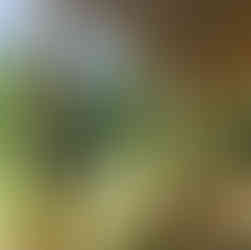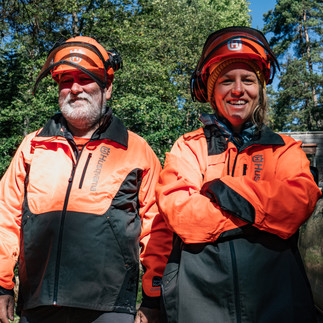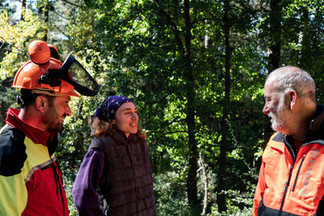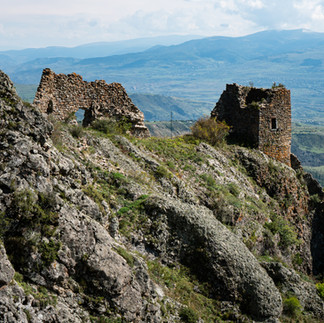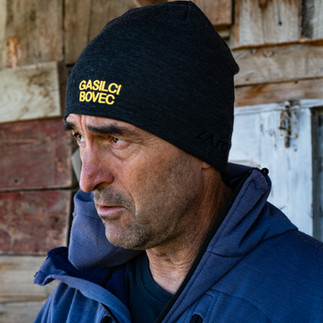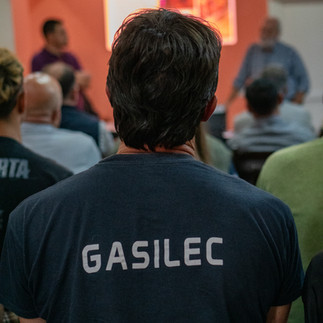PHOTO ESSAY | Trees, Traditions and Tourism; Sustainable Forest Management in Adigeni
- Carmen Kuntz
- Nov 6, 2024
- 10 min read
Updated: Dec 20, 2024
Building sustainable tourism in the forests and mountains of Adigeni, Georgia

As the sunsets behind the mountains that surround the rural village of Mohke in Adigeni, Georgia, the busy village starts to quiet down. Chainsaws and tractors turn off, cattle wander home to stables. People come in from working in the fields, forest and gardens. But down in a small clearing underneath the Mohke waterfall, a small light glows in the darkening surroundings. A campfire. A dozen tents are scattered nearby, all within a freshly built fence. An outdoor shower, drinking water tap and a pair of outhouses sit between the fence and the forest. And a dozen people, all dressed in down and fleece, mill about, sipping tea, sitting by the fire and enjoying the tranquility of being outdoors after
dark.
Both the infrastructure, and the campers are here as result of a collaboration between Slovenia and Georgia. The project, “Sustainable Forest Management in Adigeni Municipality” had two phases focused on providing a foundation for sustainable forest management including nature based tourism and improving the safety of forestry practices in this region of Georgia.
The project complements the conservation activities of ECF and is implemented by the National Forest Agency of Georgia (the Ministry of Environment Protection and Agriculture of Georgia) with financial support provided by the Centre for International Cooperation and Development of Slovenia (CMSR). A consortium composed of the World-Wide Fund for Nature (WWF) Caucasus Programme Office and two Slovenian consulting companies, ZaVita Consulting and Stritih Sustainable Development coordinated, implemented and provided consulting services.
The primary objective of the project was to secure sustainability of forest management in the forest-rich area of Adigeni. In the first phase (from 2020 to 2022) this included the development of a forest management and a forest recreation plan, investment in modern forestry equipment and training of trainers for safe work in the forest. In the second phase (in 2024), the focus is on initiating nature based tourism, training of local people in efficient and safe work in the forests and improving forest road construction. All this aims to improve the socio-economic conditions of the local population through rural tourism and the positive economic spinoffs that come from the sustainable management of forests.
The first volunteer summer camp
The first volunteer camp in June 2024 was successful in building the camping area and trail to access it, in addition to the forestry activities. The camping area is designed to host backpackers, or tourists traveling in 4x4 or overlanding vehicles. As this area is very close to other popular destinations for tourists like Goderdzi Pass, Zekari Pass, Abastumani Resort and Akhalstikhe, the waterfall trail and camping area offer a new attraction and an additional service to jump-start the development of sustainable, nature-conscious tourism in Adigeni.
The trail was built by 12 Slovenian volunteers – experts in forestry, outdoor tourism, and sustainable development – in collaboration with a group of Georgian volunteers and villagers from Mokhe as a part of a volunteer summer camp that took place from June 11th to 20th, 2024. The trail is approximately 1.3 km long and descends 160 m.
After a successful first phase of the project – which saw the construction of all the camp infrastructure and a trail from the village of Mohke down to the camp area – a second phase was developed in order to tackle some of the challenges which emerged during phase 1.
The second volunteer summer camp
This second volunteer camp was implemented at the end of September The team of Slovenian volunteers established three trails and shared their knowledge and ideas about development opportunities with locals and local administration.
The focus of this camp was on:
- Creating and developing potential for hiking trails at nearby points of interest; - Further developing safe and sustainable forestry practices; - Inspiring and sharing knowledge about the economic possibilities that sustainable eco-tourism can provide to the region through knowledge sharing from a collection of Slovenian experts.
“We collected a group of people with a mix of different experiences with the hope that they can share their experience with locals. The idea is to make a nature-based attraction and then the locals can build around it; we want to avoid big concrete hotels and encourage a connection with nature. Its meant to let them grow and learn as they go.” - Jernej Stritih, ECF Chief Technical Advisor
Participants of the camp included Slovenian volunteers with experience in outdoor recreation and mountain tourism and one member of the NFA. Among the participants were also five students from Postojna Forestry School in Slovenia. The varied experience of the volunteers in both forestry and tourism was welcomed, as well as their willingness to get their hands dirty and work hard building trails. The following photo essay used their own words to describe the experience as well as disseminate some of the knowledge they passed on during their time in Adigeni.
***
FORESTRY
Badri Beridze - Head of the community-based organisation in Mokhe
“The Slovenian Government and Slovenian people helped to solve the problem of safety in our forests. I spent 15 days in Slovenia learning to use a chainsaw safely and good practices. And I already started working with villages here – I have 2-3 groups of about 35 people who I’m training.”“Everything is wonderful, the natural condition of the camp and the structures. I wouldn’t change anything.”
Sophio Tabagari - Head of Strategy and Planning and Management, National Forestry Agency, Georgia
“I wanted to get involved in this project to see and understand how these kinds of nature conservation and development projects work; I wanted to see the wider perspective and how traditions and a more traditional way of life can be applied to forestry and tourism initiatives. And I wanted to experience it all first-hand."
“In this area ecotourism is not yet developed and I think the locals here are very motivated and we have these CBOs which connect with locals – they feel they are part of it and thus can contribute. And the knowledge and skills transfer from the volunteers to the locals is such an important part of this project.”During both volunteer camps, locals provided fresh yogurt, cheese, honey, fruit, nuts and bread. They also prepared several dinners with Georgian-style barbecue and other local dishes. This was an accurate example of how locals benefit economically from the camp while providing an authentic and traditional experience for guests. “It’s refreshing the region and also promoting the experience of camping in such a way that Georgians can become more aware of camping and how this experience can connect to locals who can sell products and services to tourists.”
***
TOURISM
In order to share the experience of the Slovenians with tourism experience, a meeting with the local community was organized in Adigeni on September 27th. This provided an opportunity to present the Slovenian experience with visitor management, ecotourism, and volunteer firefighting system, and was presented by:
Jernej Stritih – Sustainable Forest Management in Adigeni (general project introduction)
Katarina Mulec – Adigeni visitor management (presentation of Slovenian expert`s ideas on how to manage various types of visitors)
Matjaž Černuta – Voluntary firefighting in Slovenia (an organized approach to keeping locals, tourists and infrastructure safe)
Alenka Volk – Eco-tourism development on a farm (unique and traditional experienced like sleeping on hay and fostering a connection with nature)
Dušan Prašnikar – Mountain Villages concept in the Alps
HIKING TRAILS + CAMP
“We want to base the tourism here on leave-no-trace tourism and to encourage people not just to look at nature but to walk through it and explore it.” - Jernej Stritih, ECF Chief Technical AdvisorKatarina Mulec - Consultant for Stritih Sustainable Development As one of the organizers of the volunteer camps, Katarina helped select experts to attend the camps and share knowledge.
“One of the focuses was to create simple infrastructure that is inexpensive to create and inexpensive to maintain.” She also outlined rules for proper behaviour in nature and in the campsite, reviewing leave-no-trace camping practices and that there must be respect on three levels; respect local communities, respecting nature and respecting property. “We feel it is important to educate visitors as well and will make information boards with the input of locals and in the local language. The message needs to be ‘we welcome you to our home, but there are some expectations about behaviour here’.”
“It’s about building simple infrastructure for locals and for tourists; to get things started. We are trying to be one step ahead and provide info and knowledge before it’s needed. So we created a team of unique profiles who could contribute the project in a long-lasting way by sharing their knowledge – ther professional experience on related topics.” “I notice that locals have trouble understanding why people would want to sleep in a tent and not in a hotel. They needed confirmation from foreigners to realize they have beautiful nature that people are willing to travel to see – recreation in forests was eye-opening for them and it’s been cool to see them thinking ahead, like how they are motivated to learn English now, so they can communicate better with tourists.”
- Matevž Premelč, Geographer and visitor management expert with ZaVita Consulting, Slovenia
During this second phase, two trails were created, improved and properly marked, from the Shoka village to Okrostikhe castle. The Shoka Gorge trail approaches the castle from the right hand side and follows a small, picturesque stream and is now appropriately marked, and was built and cleaned in a way that requires minimal upkeep in the future.
“Part of highlighting the tourism potential of the region was creating or refreshing trails, so that guests have options for day trips and activities.”
The easy Shoka – Okrostsikhe trail also starts at the end of village Shoka and also ends at the castle, but is less technical and appropriate for a wider variety of visitors. It was cleaned, built where needed and marked in yellow.
SAFETY OF LOCALS and VISITORS
Matjaž Černuta, Chief of Bovec Volunteer Firefighting Team, Slovenia When encouraging people to travel to a region, it’s important to have safety measures in place, especially when camping and campfires are being used. Matjaž Černuta was asked to join the camp as a volunteer firefighter to present the concepts used in Slovenia to the locals in Adigeni, specifically regarding wildfires.
“In Slovenia we have an efficient system that is time-tested and well-used. We have developed some practices that are specific for mountain regions, using smaller amounts of water than traditional firefighting.” He discussed the potential for further developing a volunteer fire fighting service using the trucks and machines they already have.
“The difference between us in Slovenia and the locals here, is that we have 150 years of volunteer firefighting tradition behind us. But by starting with kids, and presenting the idea to the whole community, they can start to build their own system and tradition of firefighting. When it comes to fire, you want to know that someone will be there in 5 minutes…not 5 hours or 5 days. That’s why this is a community action.” - Matjaž Černuta, Chief of Bovec Volunteer Firefighting Team, Slovenia
ACCOMMODATIONS and TOURISM EXPERIENCES
On the last full day of volunteer camp, 5 participants hiked from the Mohke campsite to the Persati mountain (summer pasture villages) to explore possibilities to establish additional, longer trails in the future. The path of the trail was recorded, winding through forest and fields ending up on the high summer pastures at one of the summer villages on top of Persati. Something the volunteers noted could have potential in these high elevation areas - which are summer pastures and where some locals still spend their summers raising livestock and growing potatoes - is the opportunity for tourist accommodation and food, an offer similar to the mountain huts of the Alps in Europe.
Another trail they marked crosses the Kvabliani River and connects the village of Mokhe, to the village of Khekovani over a hanging bridge.
Dušan Prašnikar, Slovenia Mountaineering Association, Mountain Villages expert presented info about how the mountain hut system operates in Europe.
“Less but better”. This is the motto of the Mountaineering Villages of the Alps which Slovenia is part of. The focus is the activity, to move with your own power. And we place an emphasis on multi-seasonal offers, giving locals a longer duration to earn an income.
Many locals are not aware that these high elevation areas are a unique attraction – both ecologically and culturally. This was something Dušan wanted to emphasize. “I wanted to share different ideas and options about what is possible with their landscapes and traditions. The vision can be similar but they need to customize it using their culture and traditions; they need to think about what they can offer. But they have big potential.
Alenka and Tomaž Volk, rural development and eco-tourism experts, Kmetija Volk, Slovenia
During her presentation, Alenka explained how her husband Tomaž and her opened their small farm to guests for a few months of the year by offering a traditional experience combining horse riding tours and sleeping on hay.
“We didn’t have to build something new, but we made something with what we have; a barn, a farm and horses. People from all over the world come to our farm to sleep on the hay – because it is something special.”Tomaž Volk is a third generation farmer and has worked with horses his whole life. “Horses don’t need much and they know the terrain where they live. Here in Adigeni, you can ride from village to village and offer ‘horse trekking’ by arranging food and accommodation in local villages. That is an experience to be shared!”
Alenka’s advice for the people of Adigeni? “They don’t have to copy and paste our ideas – they should keep their traditional lifestyle and remember that it is their biggest treasure. If they just open their homes to tourists to see how they live – that’s why I would travel to Georgia!”
Carrying Momentum
“We are here to promote sustainable tourism, while invigorating the development of the local community. The diversity of the landscape here in Georgia makes it unique and the Georgian people are willing to help and host, in a genuine way that is not forced and makes for a real traveling experience.” - Matevž Premelč, Geographer and visitor management expert with ZaVita Consulting, Slovenia

The eagerness to help and the enthusiasm of the Slovenian volunteers provided a boost, but it is the vision and dedication of the locals in Mohke and Adigeni which illustrates a promising future for the development of eco-tourism in the region.
Many thanks to the communities who welcomed the project, volunteers and showed great Georgian hospitality. And to the volunteers from both camps, who contributed in both physical and technical ways, contributing both sweat and hard work, but also sharing their deep knowledge on many topics. This project provides a solid foundation for sustainable tourism with a connection and respect for nature, which illustrates the ECF’s goals of protecting biodiversity while improving the socio economic situation of locals. All parties involved are looking forward to the developments, elaboration and continuation of this project in the coming months and years. *















